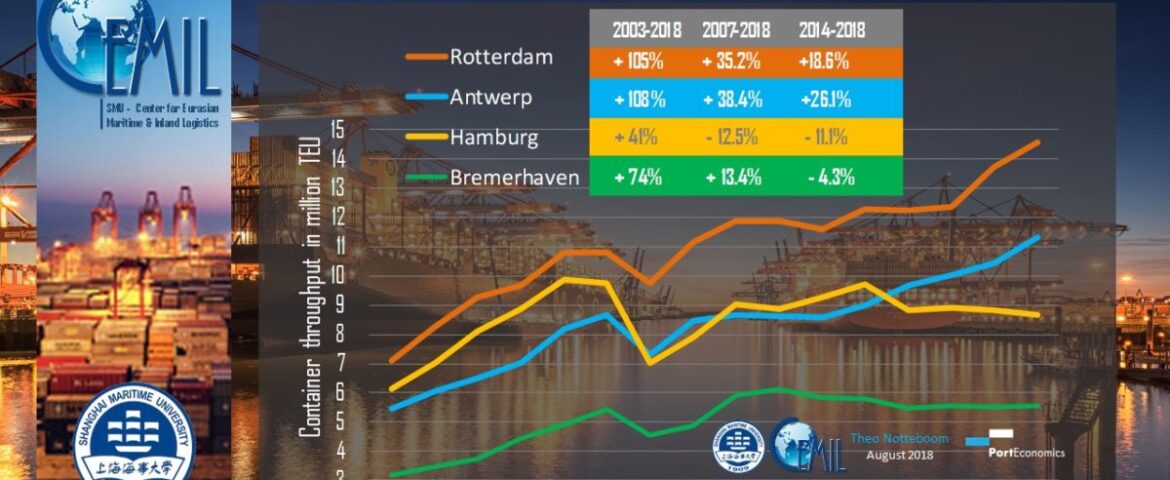Recently, it was announced that the project to deepen and widen the river Elbe, the nautical access to the port of Hamburg, got the green light. The river Elbe was deepened for the last time in 1999. The idea to improve the nautical conditions on the Elbe is on the table already for many years but project approval was stalled due to environmental issues and procedural complexities. Dredging projects are sensitive in political, port and community circles given the investments involved and the associated economic and environmental impacts, leading to a difficult and complex evaluation of such investments.
Existing channel depths are not sufficient for Hamburg to accommodate fully laden container ships of the latest generation. Shipping lines have always valued Hamburg’s cargo generating potential and its proximity and connectivity to key inland markets. Therefore, shipping lines have dealt somewhat with the nautical access limitations of Hamburg by adjusting their ports of call sequences in North Europe. However, with the further growth of ship sizes in the past few years, it became more and more evident that Hamburg’s market position started to become seriously affected. For example, on the important North Europe-Far East route, Hamburg now receives 8 weekly calls on a total of 19 weekly services. In 2015, 80% of the liner services on the North Europe-Far East trade still called at Hamburg. The graph shows that Hamburg is losing ground to Rotterdam and Antwerp in throughput terms on a rather continuous basis since 2014. Based on the growth figures for the first half of 2018 (+6.2% for Rotterdam, +8.3% for Antwerp, -2.7% for Hamburg), it is expected that the throughput gap between Rotterdam/Antwerp and Hamburg will further increase in 2018.
Rotterdam and Antwerp, the largest container ports in Europe, have recorded healthy growth figures in recent years, but also outperformed German ports (Hamburg in particular) when taking a longer term perspective. Investments in nautical access and container terminal capacity have certainly played a role in the strong performance of Rotterdam and Antwerp. A deepening program of the river Scheldt, the access route to Antwerp, was completed in 2011 in view of guaranteeing access to the largest container vessels within acceptable tidal windows. The Deurganck dock at the left bank of the port of Antwerp opened in 2005. The dock saw strong throughput growth in recent years after it welcomed the massive MPET, a joint venture terminal of MSC and PSA, to join Antwerp Gateway terminal at the dock. The Flemish government is expected to take a decision soon on a further expansion of Antwerp’s container terminal capacity by at least 7 million TEU to accommodate expected container growth in the coming decade. The Maasvlakte 2 developments in Rotterdam included the construction of two large scale container facilities. The first phases of both terminals came on stream in 2014, while also the Euromax terminal has room for future growth.
With the upcoming deepening and widening of the Elbe, Hamburg ends a long period of uncertainty regarding the completion of the deepening program. Antwerp went through a similar phase during the lengthy decision-making trajectory prior to the realization of the 2010-2011 Scheldt deepening program. The period of uncertainty placed Hamburg in a danger zone for (too) many years and increased the attractiveness of other ports, such as Antwerp and Rotterdam, but also relative newcomers Wilhelmshaven and Gdansk. As a result, Hamburg is facing increased competition for accommodating sea-sea transhipment flows (mainly to the Baltic) and for gateway cargo flows to its shared hinterland (note that a number of south European ports, such as Trieste, are also gaining ground in serving specific hinterland areas in Europe). It will be interesting to see to what extent Hamburg will be able to regain growth and increase its market share in the years to come. In other words, will supply chains be rerouted in favour of Hamburg after the completion of the Elbe deepening?
Note: in 2016, I devoted an academic paper to the way upstream seaports Antwerp and Hamburg are dealing with the scale increases in vessel size (full reference: Notteboom, T., 2016, The adaptive capacity of container ports in an era of mega vessels: the case of upstream seaports Antwerp and Hamburg, Journal of Transport Geography, 54, 295-309, download the paper here)













